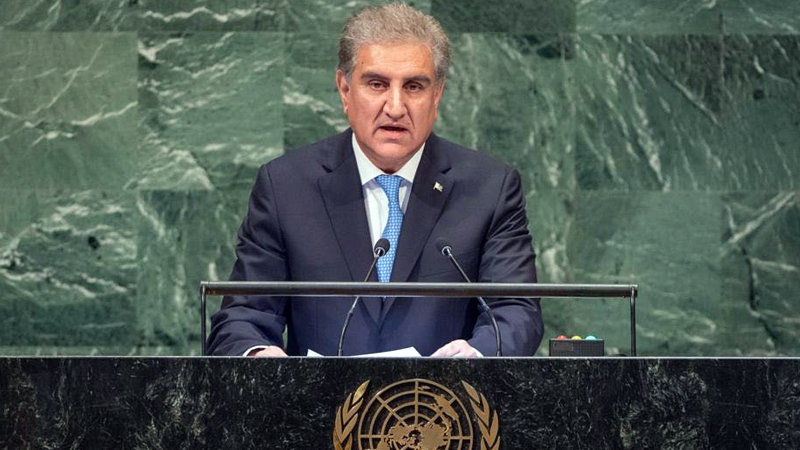
NEW YORK: Foreign Minister Shah Mehmood Qureshi on Saturday told the United Nations General Assembly that Pakistan wanted to engage with “all countries and neighbours on the basis of peace and equality”.
“Our government is keen to pursue a policy of partnerships for peace, security and prosperity in our immediate neighbourhood and beyond. We seek a peaceful environment to promote our development agenda both at the national level and in our region. I stand before this assembly as the representative of a quintessential developing country, that has at its heart, the welfare of its people, Qureshi said in his address to the 73rd session of the United Nations General Assembly in Urdu.
Briefing the audience about the long outstanding issues with India, Qureshi cleared that Pakistan wanted to “resolve outstanding issues with India through dialogue but the Indian government had wasted an opportunity for the third time”.
The foreign minister said that the unresolved Kashmir dispute poses a great threat to peace and stability in the region. “Peace can never be established in South Asia unless the issue of Kashmir is resolved in accordance with the UN resolutions”.
He said that India must top human rights violations in the occupied Kashmir and also stop ceasefire violations across the line of control.
The foreign minister warned that India would face a severe reaction if it attempted any misadventure against Pakistan”.
“India has been sponsoring terrorism in Pakistan and Indian spy Kulbhushan Jadhav was involved in planning and sponsoring terrorist activities in Pakistan on behalf of the Indian government,” Qureshi said, while briefing the world about direct Indian involvement in sponsoring terrorist activities inside Pakistan.
The foreign minister said, “Today the world is at a crossroads as protectionism, populism and isolationism are gaining currency. New forms and manifestations of imperialism are appearing, and dark clouds of trade wars are looming large.”
“In these uncertain times, the global community seems desperate for leadership, vision and an order,” said Qureshi, adding that Pakistan will continue to “collaborate on the platforms of United Nations and Organisation of Islamic Cooperation to reverse the tide of bigotry”.
He continued: “We note with concern seismic shifts in the geopolitical landscape of the Middle East. As existing conflicts exacerbate, new threats have emerged. Competing interests of regional and extra regional powers are deepening long standing fissures, and widening the fault lines, even as the tragedy of Palestine continues to fester.”
He told the world that Muslims across the world were pained at a planned competition of caricatures of Holy Prophet (Peace Be Upon Him). “This deeply hurt Muslim sentiments and sensibilities,” he said, adding that Pakistan would continue to collaborate with friends and partners to reverse the growing tide of bigotry, build cross cultural understandings, and promote dialogue amongst civilizations.
Referring to Afghanistan, the foreign minister said, “Afghanistan and together with it, Pakistan, has suffered heavily at the hands of global power play, strategic miscalculations and cognitive dissonance.
There is no military solution to the war in Afghanistan. A negotiated settlement has assumed urgency in the face of the worrisome and growing presence of Daesh in Afghanistan.”
He said that Pakistan would continue to lend its support to an Afghan-owned and Afghan-led process of peace and reconciliation.
“Our role and sacrifices can perhaps be better appreciated when juxtaposed against the rising tide of anti-immigrant sentiments in nations, more resourceful and developed than ours, that have faced the brunt of fewer immigrants, over a shorter timescale. Because of this protracted situation, Afghanistan’s security has a direct spill over impact on our own security and stability. We look forward to the safe, dignified and voluntary return of Afghan refugees to their homeland.”
On climate change, the foreign minister said that Pakistan was among those countries, which were adversely being affected from the global warming. “We believe that the resolutions in Paris conference should not be compromised for industrial interests,” he said.
The minister informed the international community that the government of Pakistan had planned to plant as many as 10 billion trees in the country.
Commenting on the China-Pakistan Economic Corridor (CPEC), the foreign minister said the multi-billion dollar project would play a key role in highlighting Pakistan’s geo-political place in the world.
“The vision of Belt and Road is a path-breaking initiative by a world leader of great sagacity and foresight to create a community of common destiny,” he said while referring to Chinese President Xi Jinping.
“It is a global common good beneficial to all. Our vision for CPEC is to help translate our goo-strategic potential into geo-economic dividend. Pakistan looks to offer the vital connectivity nodes linking the Middle East with western China, and affording Central Asia the shortest most feasible access to the sea.”
At the start of his address, the foreign minister extended condolences over the passing of former UN secretary-general Kofi Annan, and also expressed sympathy with the government and the people of Indonesia for the damage caused by recent earthquakes and tsunami.
He also felicitated Maria Fernanda Espinosa Graces upon her election as president of the General Assembly. “The stewardship of this session by an accomplished leader of her ranking and stature, would undoubtedly lend to the proceedings of this Assembly greater credence and strength.”
He also commended Miroslav Lackjack for his able guidance of the previous session.
“We appreciate Secretary General Antonio Gutteres for his exemplary leadership of the organisation, and support his efforts to instill a new sense of mission and direction in the United Nations.”
Published in Daily Times, September 30th 2018.